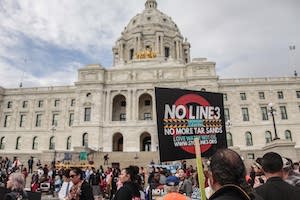
In mid-November, two Democratic Midwest governors made opposite decisions regarding two oil pipelines owned by the same Canadian company, Enbridge. In Michigan, Gov. Gretchen Whitmer and her Department of Natural Resources denied an easement so Enbridge’s Line 5 oil pipeline could continue operating, as it has since 1953. Whitmer called on Enbridge to cease operations by mid-2021. Michigan was the site of one of the worst oil spills in U.S. history, when an Enbridge pipeline ruptured in 2010 and contaminated the Kalamazoo River.
But in nearby Minnesota, Gov. Tim Walz and his state’s Public Utilities Commission granted all but one of the permits and approvals needed by Enbridge to build their controversial Line 3 pipeline replacement project across northern Minnesota. The pipeline would threaten water quality and cross sensitive wetlands near the headwaters of the Mississippi River, where indigenous nations claim treaty rights and harvest wild rice. The Utility Commission’s own Environmental Justice Advisory Committee submitted a letter opposing the Line 3 project, in order to uphold their Environmental Justice policy.
Between The Lines’ Melinda Tuhus spoke with Winona LaDuke, who ran for vice president twice on the Green Party ticket in 1996 and 2000. LaDuke, a member of the White Earth Band of the Ojibwe, is the founding director of Honor the Earth, an indigenous environmental advocacy organization in northern Minnesota. She was one of a majority of members of the Environmental Justice Advisory Committee who resigned after the permits were approved, writing, “We cannot continue to legitimize and provide cover for the [commission’s] war on Black and brown people.” Reached by phone in her car, LaDuke talks about the successful fight in Michigan, and the current campaign opposing Line 3 pipeline project in Minnesota.
WINONA LADUKE: What was interesting to us is that one governor, Gov. Whitmore, used the public trust doctrine, saying that “in the interest of the common waters of Lake Michigan and (state of) Michigan, I am not going to renew this easement to Enbridge.” And in comparison, the governor of Minnesota — there are six pipelines across Minnesota already — and this would have to have a new route because the Leach Lake tribe said you can’t do this to us again. And so they’re trying to force a new route and he approved all the permits last week. It’s like two different decisions, same company. It’s like the tale of two governors. And all I can think is that she’s a much more insightful governor than my governor. There’s a rise of women’s leadership that is remarkable. She has been threatened. They tried to kidnap her. The president has laid his eyes upon her with such vehement hatred, and then she stood up to Enbridge, too. So I give her a lot of credit.
MELINDA TUHUS: So the permits were approved. Does that mean they are going to start building it?
WINONA LADUKE: They are, and they will be met by massive resistance and civil unrest in Minnesota. And they are bringing 4,200 workers into these camps and into our cities and into our small towns in the middle of Covid.
MELINDA TUHUS: Tell me a little about the opposition to the pipeline. I know it’s led by indigenous folks on the front lines, since the pipeline would go through your territory.
WINONA LADUKE: The opposition is very broad. A bunch of librarians locked themselves to the pipe and closed it down, and then a bunch of Catholics did. There’s widespread opposition; 70,000 people testified against this pipeline: 70,000. Lawsuits have been filed for seven years by citizens’ groups and tribal governments and landowners. There is big opposition.
MELINDA TUHUS: Winona LaDuke, you mentioned that the company is bringing in 4,200 pipeline workers. Have the man camps to house the workers already been built?
WINONA LADUKE: There are already camps being constructed and they have told people to go into private homes and into trailer parks. So the trailer parks and recreational camping have basically been filled up with pipeline workers. But then they’re going into our town and going into stores without masks on, and a lot of them are armed. So you have armed, unmasked white men walking into small town stores.
MELINDA TUHUS: What a nightmare!
WINONA LADUKE: It is a nightmare, a public health nightmare, and that’s why we think the governor should just quit this, because it’s a public health nightmare.
MELINDA TUHUS: So this sounds like Standing Rock 2020, reminiscent of when thousands of indigenous and non-indigenous water protectors rallied around the Standing Rock Sioux Tribe in North Dakota in 2016 to try to stop the Dakota Access oil pipeline. Do you see it that way?
WINONA LADUKE: I’m seeing it that this is my land and I’m going to defend it and a lot of people are going to help me. There’s a lot of people opposed to this pipeline. I don’t know what it’s going to be like. They have 300 miles of pipeline not built, but they are starting in seven places at once.
MELINDA TUHUS: Do you see President-elect Joe Biden coming into office as offering an opportunity to stop Line 3?
WINONA LADUKE: What we need is a Green New Deal. We need a just transition because you got a bunch of people trying to dig the remaining rocks out of northern Minnesota and put in the last tar sands pipeline. That’s dumb. It’s just time to move on. Look, there are some trees. I’m looking for some tipi poles and I see some here.




